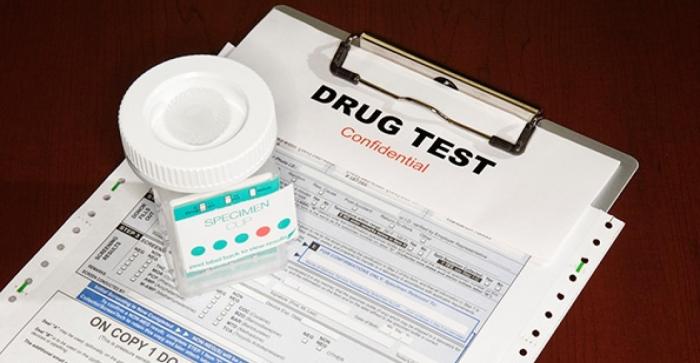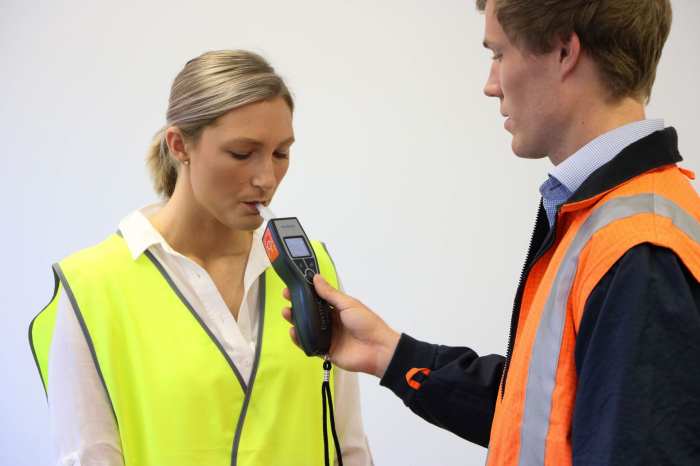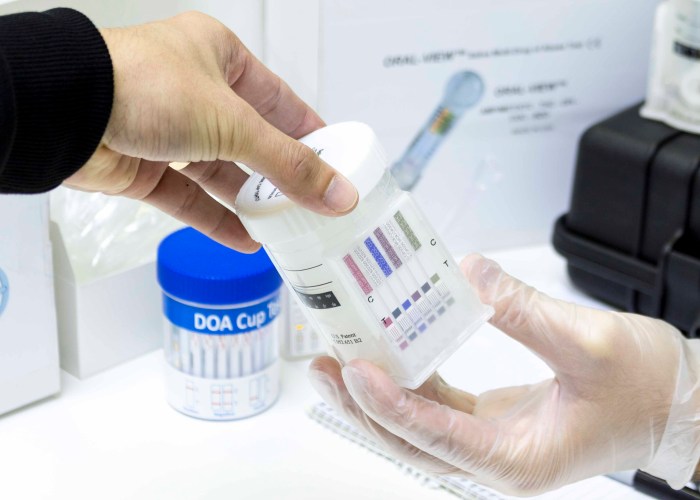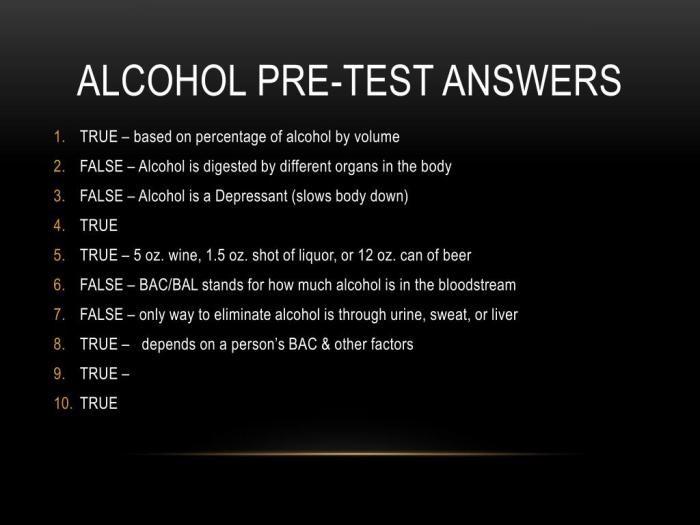Embark on an authoritative exploration of Examen de Alcohol y Drogas Respuestas, where we delve into the intricacies of substance testing, its legal implications, health risks, and effective prevention and treatment strategies.
Unravel the accuracy and reliability of various alcohol and drug tests, discover the legal consequences of substance use, and gain insights into the detrimental health effects of substance abuse.
Alcohol and Drug Testing

Alcohol and drug testing plays a vital role in various settings, including workplace safety, law enforcement, and healthcare. These tests help detect the presence of alcohol and illicit substances in individuals, providing valuable information for decision-making and intervention.
There are several types of alcohol and drug tests, each with its advantages and limitations:
- Breathalyzers:Measure the alcohol content in breath, providing an estimate of blood alcohol concentration (BAC).
- Blood tests:Determine the exact BAC by analyzing blood samples.
- Urine tests:Detect the presence of drug metabolites in urine, indicating recent drug use.
- Hair tests:Analyze hair samples to identify drug use patterns over extended periods.
The accuracy and reliability of these tests vary depending on the type of test and the substance being detected. Breathalyzers and blood tests are generally considered reliable for alcohol detection, while urine and hair tests can provide information about drug use over time.
Alcohol and drug testing is used in various settings, including:
- Workplace safety:To ensure employee safety and prevent accidents related to alcohol or drug use.
- Law enforcement:To detect driving under the influence (DUI) and other alcohol- or drug-related offenses.
- Healthcare:To diagnose substance use disorders, monitor treatment progress, and provide early intervention.
Legal Implications of Alcohol and Drug Use

Alcohol and drug use can have significant legal consequences, ranging from traffic violations to criminal charges.
Driving Under the Influence (DUI)
Driving while intoxicated by alcohol or drugs is a serious offense that can result in:
- License suspension or revocation
- Fines
- Jail time
- Increased insurance premiums
Possession and Distribution of Controlled Substances
Possession and distribution of illegal drugs are criminal offenses, with penalties varying depending on the type and quantity of substance involved. Penalties can include:
- Fines
- Jail time
- Probation
- Forfeiture of assets
Impact on Employment and Housing
Alcohol and drug use can also impact employment and housing:
- Employment:Employers may terminate employees for alcohol or drug-related misconduct, such as intoxication on the job or positive drug tests.
- Housing:Landlords may refuse to rent to individuals with a history of alcohol or drug abuse.
Health Risks of Alcohol and Drug Use

Alcohol and drug use can have severe health consequences, both short-term and long-term.
Short-Term Effects
Short-term effects of alcohol and drug use include:
- Impaired judgment and coordination
- Slurred speech
- Nausea and vomiting
- Increased heart rate and blood pressure
Long-Term Effects, Examen de alcohol y drogas respuestas
Long-term effects of alcohol and drug use can include:
- Liver damage
- Heart disease
- Stroke
- Cancer
- Mental health disorders
Addiction, Overdose, and Withdrawal
Chronic alcohol and drug use can lead to addiction, a complex disease characterized by compulsive substance use despite negative consequences. Addiction can result in:
- Overdose:A potentially fatal situation where excessive substance use overwhelms the body’s systems.
- Withdrawal:A range of physical and psychological symptoms that occur when an individual stops or reduces substance use after prolonged use.
Alcohol and drug use can also exacerbate mental health disorders, such as anxiety and depression.
Prevention and Treatment of Alcohol and Drug Use

Preventing and treating alcohol and drug use requires a comprehensive approach involving education, intervention, and support.
Prevention
Effective prevention strategies include:
- Education:Providing accurate information about the risks of alcohol and drug use.
- Peer support:Encouraging positive peer relationships and discouraging substance use.
- Community programs:Offering safe and supportive environments for youth and adults.
Treatment
Treatment for substance use disorders typically involves a combination of:
- Medication:To manage withdrawal symptoms and cravings.
- Therapy:To address the underlying causes of substance use and develop coping mechanisms.
- Support groups:To provide a supportive and accountable environment for recovery.
The success of treatment depends on the individual’s commitment and the availability of resources. Support groups and recovery programs play a vital role in maintaining sobriety and preventing relapse.
FAQ Compilation: Examen De Alcohol Y Drogas Respuestas
What is the purpose of an alcohol and drug test?
Alcohol and drug tests are used to detect the presence of alcohol or drugs in a person’s system, typically for legal, employment, or health-related purposes.
How accurate are alcohol and drug tests?
The accuracy of alcohol and drug tests varies depending on the type of test and the substance being tested. However, most tests are highly sensitive and can detect even small amounts of substances.
What are the legal consequences of driving under the influence of alcohol or drugs?
Driving under the influence of alcohol or drugs is a serious offense that can result in fines, license suspension, or even imprisonment.